'Parents cry because they can't provide food'
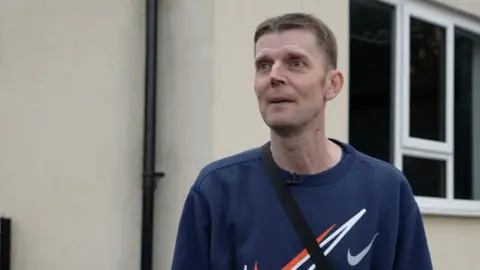 BBC
BBCThe number of families struggling to provide food for their children has surged since the pandemic started, research shows. In many cases, the people affected do not currently qualify for free school meals. But in Stalybridge, Greater Manchester, one man's efforts are keeping many local children from going hungry.

Steve Barton spends his days worrying about food. He is agitated as he inspects the shelves of his community food bank, which line the inside of a shipping container in a car park next to a busy road in his hometown of Stalybridge.
Steve relies on donations from the public and supermarkets to keep the shelves full, but says the people who were once giving him donations are now turning to him for help.
"I've not got the food to sustain this. Right now we've got two tins of potatoes, I need 80 tins of potatoes this week. I need this food bank full, because once I do deliveries it's empty again on Friday. So yes I do worry."
It was Steve's job as a gardener which first brought him into contact with families who were struggling to put food on the table.
After a tough childhood and a brief spell of homelessness, Steve's no stranger to deprivation himself.
But six years ago he started making deliveries of food and clothing in his spare time to those who needed it, using the living room of his mother's house as a base for what became "Barty's Community Foodbank".
The shipping container was a welcome donation 18 months ago, with more space for storing food just as the economic impact of the pandemic was taking hold.
The demand is constant and growing, up 50% on this time last year. With a handful of fellow volunteers, he provides food to about 130 families, six primary schools, several care homes and a women's refuge each week.
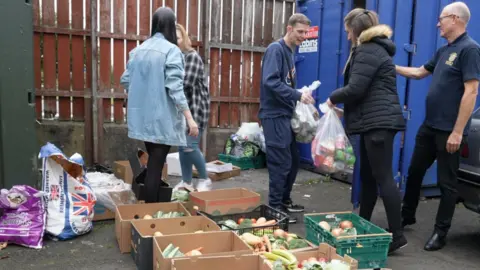
In the last few months the majority of people using his food bank are working families, whose children don't qualify for free school meals.
"I was seeing families here crying, I was seeing children really, really struggling. These are people who are working, who have been on furlough. Gas is going up, food is going up, everything is going up, but their wages aren't going up.
"I struggle myself and all my friends are roofers, they're bricklayers, they work all week and still can't afford food."
The doors to the shipping container deliberately face away from the road, so that it is unclear who's picking up and who's dropping off food.
Following Steve for the day is a dizzying experience. He's a ball of nervous energy with a steady stream of deliveries, and a phone that rings every few minutes with another inquiry about the food bank or possible leads on a donation.
Local business help
We meet at a wholesale fruit and vegetable market on the outskirts of Manchester.
He is there to pick up his weekly order, which is paid for by a businessman called Abdul Patel. His small family-run company has been donating £280 a week since the start of the pandemic to supply fresh fruit and vegetables to three food banks in Tameside, including Steve's.
Today is the first time they're meeting each other. Steve beams and shakes Abdul's hand, clearly delighted to get a chance to thank him in person.
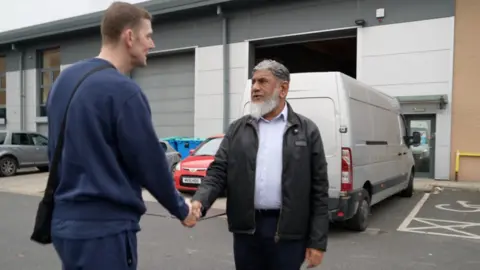
Abdul says a charity called Action Together pointed him in Steve's direction.
"It all started when the first lockdown started and we were hearing stories of deprivation and looking to see how we could help as a company. I'm pleased to see it's doing some good. It's absolutely commendable what Steve is doing."
Next stop on the delivery route is Buckton Vale Primary School. Head teacher Deborah Brown says about 80% of the families at the school who use the food bank are working families, and Steve's twice-weekly donations are vital for keeping supplies stocked up.
"It's more difficult for our families to put food on the table than I think people realise. We have a significant number of families who have been struggling throughout the pandemic and continue to struggle, parents on furlough who have been living off an 80% salary for a long time.
"Schools are in my opinion becoming hubs, we are the place that families will visit for support. That adds significant pressure on staff. There needs to be an increase in the eligibility threshold for free school meals."
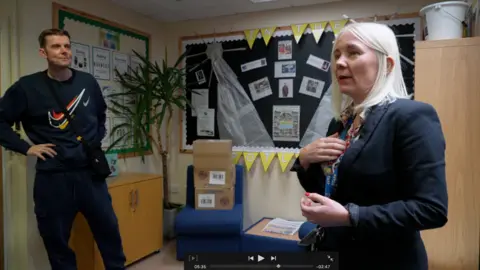
That's a call echoed by charity The Food Foundation. It says that more than half of children experiencing difficulty getting enough food in England don't qualify for free school meals, and warns that rising food and fuel prices means pressure on low-income families is likely to increase this winter.
The most recent government figures for England say one in five pupils (or 1.74 million children) were eligible for free school meals at the beginning of this year. That was an increase of 420,000 since the start of the pandemic.
But recent research by The Food Foundation suggests that 2.5 million children live in households which experienced difficulties accessing sufficient quantities of food between February and July this year, levels that are approximately 27% higher than before Covid struck.
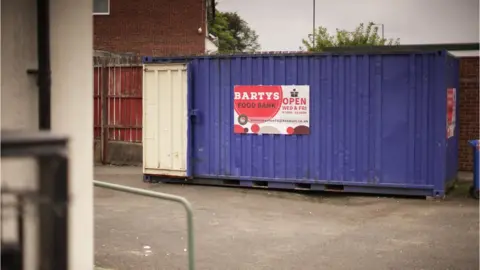
Food Foundation executive director Anna Taylor told the BBC: "What we would like is for that free school meals threshold to be expanded to include households earning less than £20,000 before benefits. That would mean just over a million extra children become eligible for free school meals."
A spokesperson from the Department for Education said the government has "expanded access to free school meals more than any other government in recent decades" and that it is providing "additional funding to councils as part of the new £500m Household Support Fund, to further support families during winter and up to March next year".
In Stalybridge, Steve's attention is turning to Christmas and whether he can sustain the food bank until then. For the past few years he's done a Christmas giveaway, gathering donations of toys for parents to give their children on Christmas Day.
He is planning to deliver to 700 families this year. But in the meantime, the phone calls for help don't stop and the endless search for donations goes on.
"If you walk up with one tin, or a million tins, I'm just grateful," he says.
